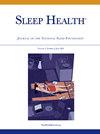College students’ socioeconomic background and sleep during the first year of college
IF 3.4
2区 医学
Q2 CLINICAL NEUROLOGY
引用次数: 0
Abstract
Objective
Sleep problems can hinder adjustment to college, but limited work has evaluated whether students’ socioeconomic background is related to changes in sleep across the first year of college. The goal of the present study was to evaluate whether college-related financial stress, college generational status, and subjective social status were associated with differences in sleep across the first year of college.
Methods
A total of n = 216 first-year college students (MAge = 18.1) at a public university were recruited for sleep quality assessment via the Pittsburgh Sleep Quality Index during the fall, winter, and spring academic quarters, and a subsample (n = 198) of these students participated in 14 days of sleep diary assessment at the beginning and end of the academic year.
Results
Greater financial stress was significantly associated with worse sleep quality, more variable daily sleep duration, and greater difficulty waking up in the mornings. First-generation status was associated with poorer quality and more variable sleep, and worse subjective social status was linked to poor-quality sleep and greater difficulty awakening, but several of these associations were reduced after adjusting for ethnicity and gender. Mean-level socioeconomic indices did not interact with time, suggesting that between-person differences in sleep were consistent across the first academic year. Within-person increases in financial stress and subjective social status were associated with lower sleep variability.
Conclusion
The study findings reveal significant socioeconomic-related differences in first-year college students’ sleep behavior. Intervention efforts to address college students’ sleep health may benefit from connecting low-socioeconomic status students with resources to facilitate adjustment to college.
大学生的社会经济背景与大学第一年的睡眠。
目的:睡眠问题可能会阻碍大学生活的适应,但有限的工作已经评估了学生的社会经济背景是否与大学第一年的睡眠变化有关。本研究的目的是评估大学相关的经济压力、大学代际地位和主观社会地位是否与大学第一年的睡眠差异有关。方法:选取一所公立大学一年级学生,共n = 216名(MAge = 18.1),于秋季、冬季和春季三个学期采用匹兹堡睡眠质量指数(Pittsburgh sleep quality Index)对其进行睡眠质量评估,其中一子样本(n = 198)分别于学年开始和结束时进行为期14天的睡眠日记评估。结果:更大的经济压力与更差的睡眠质量、更多变的日常睡眠时间和更大的早晨醒来困难显著相关。第一代的社会地位与较差的睡眠质量和更多变的睡眠有关,而较差的主观社会地位与较差的睡眠质量和更大的觉醒困难有关,但在调整种族和性别后,这些联系中的一些减少了。平均水平的社会经济指数与时间没有相互作用,这表明在第一学年,人与人之间的睡眠差异是一致的。个人经济压力和主观社会地位的增加与较低的睡眠变异性有关。结论:研究结果显示,大一学生的睡眠行为存在显著的社会经济差异。解决大学生睡眠健康问题的干预措施可以通过将低社会经济地位的学生与资源联系起来,以促进他们适应大学生活。
本文章由计算机程序翻译,如有差异,请以英文原文为准。
求助全文
约1分钟内获得全文
求助全文
来源期刊

Sleep Health
CLINICAL NEUROLOGY-
CiteScore
6.30
自引率
9.80%
发文量
114
审稿时长
54 days
期刊介绍:
Sleep Health Journal of the National Sleep Foundation is a multidisciplinary journal that explores sleep''s role in population health and elucidates the social science perspective on sleep and health. Aligned with the National Sleep Foundation''s global authoritative, evidence-based voice for sleep health, the journal serves as the foremost publication for manuscripts that advance the sleep health of all members of society.The scope of the journal extends across diverse sleep-related fields, including anthropology, education, health services research, human development, international health, law, mental health, nursing, nutrition, psychology, public health, public policy, fatigue management, transportation, social work, and sociology. The journal welcomes original research articles, review articles, brief reports, special articles, letters to the editor, editorials, and commentaries.
 求助内容:
求助内容: 应助结果提醒方式:
应助结果提醒方式:


